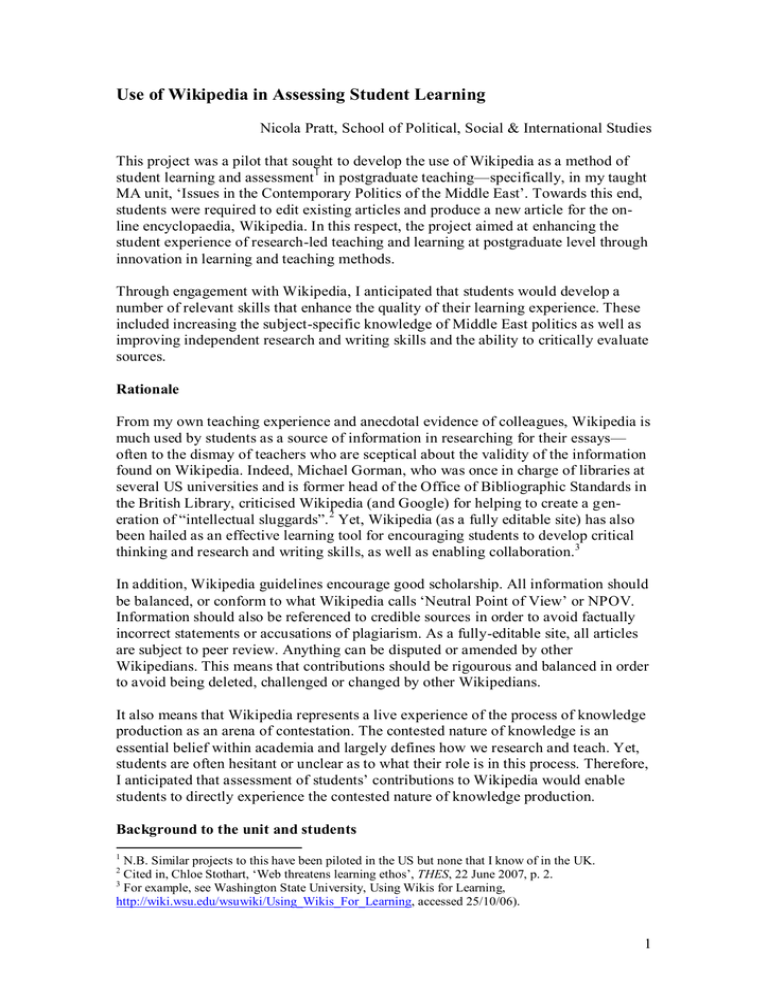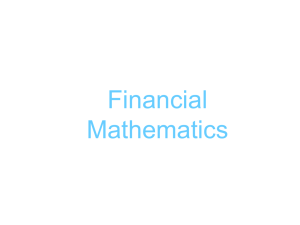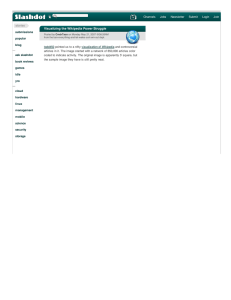Use of Wikipedia in Assessing Student Learning
advertisement

Use of Wikipedia in Assessing Student Learning Nicola Pratt, School of Political, Social & International Studies This project was a pilot that sought to develop the use of Wikipedia as a method of student learning and assessment 1 in postgraduate teaching—specifically, in my taught MA unit, ‗Issues in the Contemporary Politics of the Middle East‘. Towards this end, students were required to edit existing articles and produce a new article for the online encyclopaedia, Wikipedia. In this respect, the project aimed at enhancing the student experience of research-led teaching and learning at postgraduate level through innovation in learning and teaching methods. Through engagement with Wikipedia, I anticipated that students would develop a number of relevant skills that enhance the quality of their learning experience. These included increasing the subject-specific knowledge of Middle East politics as well as improving independent research and writing skills and the ability to critically evaluate sources. Rationale From my own teaching experience and anecdotal evidence of colleagues, Wikipedia is much used by students as a source of information in researching for their essays— often to the dismay of teachers who are sceptical about the validity of the information found on Wikipedia. Indeed, Michael Gorman, who was once in charge of libraries at several US universities and is former head of the Office of Bibliographic Standards in the British Library, criticised Wikipedia (and Google) for helping to create a generation of ―intellectual sluggards‖. 2 Yet, Wikipedia (as a fully editable site) has also been hailed as an effective learning tool for encouraging students to develop critical thinking and research and writing skills, as well as enabling collaboration.3 In addition, Wikipedia guidelines encourage good scholarship. All information should be balanced, or conform to what Wikipedia calls ‗Neutral Point of View‘ or NPOV. Information should also be referenced to credible sources in order to avoid factually incorrect statements or accusations of plagiarism. As a fully-editable site, all articles are subject to peer review. Anything can be disputed or amended by other Wikipedians. This means that contributions should be rigourous and balanced in order to avoid being deleted, challenged or changed by other Wikipedians. It also means that Wikipedia represents a live experience of the process of knowledge production as an arena of contestation. The contested nature of knowledge is an essential belief within academia and largely defines how we research and teach. Yet, students are often hesitant or unclear as to what their role is in this process. Therefore, I anticipated that assessment of students‘ contributions to Wikipedia would enable students to directly experience the contested nature of knowledge production. Background to the unit and students 1 N.B. Similar projects to this have been piloted in the US but none that I know of in the UK. Cited in, Chloe Stothart, ‗Web threatens learning ethos‘, THES, 22 June 2007, p. 2. 3 For example, see Washington State University, Using Wikis for Learning, http://wiki.wsu.edu/wsuwiki/Using_Wikis_For_Learning, accessed 25/10/06). 2 1 ‗Issues in the Contemporary Politics of the Middle East‘ has now been running for three years. It is one of several options offered at MA level by staff in the School of Political, Social & International Studies (PSI). During these three years, the average class size has been eleven. The majority of students are registered for the MA in International Relations or one of the combined International Relations courses (e.g. International Relations and Development Studies). In addition, the unit is open to students from other schools and in 2006–07, I had students from DEV and LIT. At least half the students in every year have been overseas students, including from nonEuropean countries. The unit, like the MA programme in general, attracts a significant number of students who have never previously studied politics or international relations. The mixed composition of the students, in terms of disciplinary background, educational background and nationality, (both home and overseas) means that they are not necessarily familiar with the conventional form of academic assessment—i.e. the academic essay. Experience demonstrates that this can be a hindrance to students gaining subject-specific knowledge as well as obtaining other essential skills in communicating and discussing ideas and concepts. I hoped that the Wikipedia project would enable students to gain subject-specific knowledge and to engage with this knowledge critically, even if they did not possess conventional essay-writing skills. Implementing the Pilot The assessment consisted of two parts. In the first part, students were required to edit existing articles on a weekly basis. They were free to choose the articles that they edited but these had to be connected with the topic of the seminar that week. In this way, the editing process was also a way to ensure that students read in preparation for the seminars. The second part of the assessment consisted of students writing their own article for Wikipedia. They could choose the topic of their article as long as it linked to a topic that we had studied on the unit. They also had to meet the Wikipedia requirements for starting a new article. In order to assess particular student contributions, each student had to create a log-in name, of which they informed me. They also had to tell me the name of the article edited/written. Through the ‗history‘ page attached to each Wikipedia article, I was able to see each student‘s particular contributions. I was also able to see where other Wikipedians had amended or deleted the student contributions. This happened on a three or four occasions. As part of the pilot, I produced instructions for using Wikipedia and also a set of marking criteria (these are attached in the appendices). The instructions for using Wikipedia were based on guidelines that are already available on the Wikipedia site at http://en.wikipedia.org/wiki/Wikipedia:School_and_university_projects/Indiana_CM CL. Results of Student Work 2 Here are some examples of some of the students‘ work. Editing: Article name: Date: Islamism (http://en.wikipedia.org/wiki/Islamism) Week beginning 5 March Article name: Date: Iraq (http://en.wikipedia.org/wiki/Iraq) Week beginning 12 March Articles written: Kifaya (Egyptian Movement for Change), http://en.wikipedia.org/wiki/Kifaya Taliban treatment of women, http://en.wikipedia.org/wiki/Taliban_treatment_of_women Israeli views of the peace process in the Israeli–Palestinian conflict, http://en.wikipedia.org/wiki/Israeli_views_of_the_peace_process_in_the_IsraeliPalestinian_conflict Evaluating the pilot project What the students said: The students were overall very positive about the project. One student wrote, In my point of view, the project has achieved its aims as when I edit an article I learn more in depth about the subject, not only because I have to read lots of books and articles but because you are editing to a large audience, which is very interesting. Another student wrote, It encouraged new ways of thinking and engaging with new technology. Students identified several benefits: - Increasing subject understanding - Improving writing and presentation skills - Improving critical thinking - Encouraging more thoughtful analysis - Seeing work in public domain appeals to ego! The drawbacks of this type of assessment were identified as: - More difficult than writing an essay - More time-consuming than other types of assessment - There is a steep learning curve in order to use the Wiki technology correctly 3 - There is more pressure to produce a good standard of work every time because it will be read by a larger audience From my point of view, the Wikipedia project enabled the students to meet the learning outcomes of the unit, with regards to gaining sufficient knowledge of particular issues in Middle East politics in order to critically engage with the relevant literature. Writing for a public audience, rather than for the teacher alone, was clearly motivating for the students and they were far more enthusiastic about the subject in comparison to previous year groups, where students had been assessed on essays. In addition, the weekly editing task contributed to well-informed seminar discussions. Almost all of the students dramatically improved their performance over time. Since only 3 out of 8 edited articles counted towards their final unit mark, this meant that they were not penalised by the innovativeness of the assessment method. However, this also meant that it was a heavy workload for all concerned. In addition, three students did not improve their performance over time and at least two of these students would have felt more comfortable with writing essays. However, the fact that none of the students found this an easy task demonstrates that it is both intellectually challenging and contributes to developing skills not already developed in other units. The most challenging aspect of writing for Wikipedia was the concept of ‗Neutral Point of View‘ (NPOV). On the one hand, from a post-positivist point of view, the term ‗neutral‘ with regards to scholarship is highly problematic. There is no single truth. However, ironically, a NPOV approach fully supports the exploration of ‗alternative truths‘. Many students initially believed that as long as they were quoting from an existing work, this represented a valid contribution to Wikipedia. Some of them failed to see that this single reference represented only one point of view and, in order to contribute to the balance of the article, they also had to represent other points of view. In several cases, student edits were deleted by other Wikipedians because they were not considered to be NPOV. The Wikipedia commitment to NPOV provided an unexpected opportunity to discuss issues concerning epistemology (although, the discussion was not framed in that way). Suggestions for future improvement and development In order to bring the workload in line with other units, I will reduce the number of edited articles that each student submits. However, in order that students have an opportunity to practise editing articles, I will organize a longer computer lab session in week 1, where I can provide more immediate guidance on using the Wiki technology, including a live demonstration of article editing. In week 2 of the unit, I need to discuss with students the meaning of NPOV as necessary preparation for writing for Wikipedia. This will necessarily involve providing extra classroom time in the first two weeks, in order that students do not feel that learning about Wikipedia is taking time away from learning about Middle East politics. In addition to the assessment tasks designed for this pilot, Wikipedia possesses other features that could enable the creation of other assessments. First, Wikipedia (like Wiki technology in general) lends itself to collaborative work and, therefore, could be used in assessing group work. Second, all Wikipedia articles have a discussion page, where Wikipedians debate the content of particular articles. Most of the articles on 4 Middle East politics possess very lively talk pages that demonstrate the high degree of contention in the field. Students could be assessed on their contributions to the talk page. In terms of rolling this out to undergraduate students, there is little doubt that this would be an interesting and useful type of assessment for them and it should be feasible at any level or for any subject. Through dissemination to colleagues, I expect that this will be rolled out to UGs in other schools and even other universities. July 2007 5



